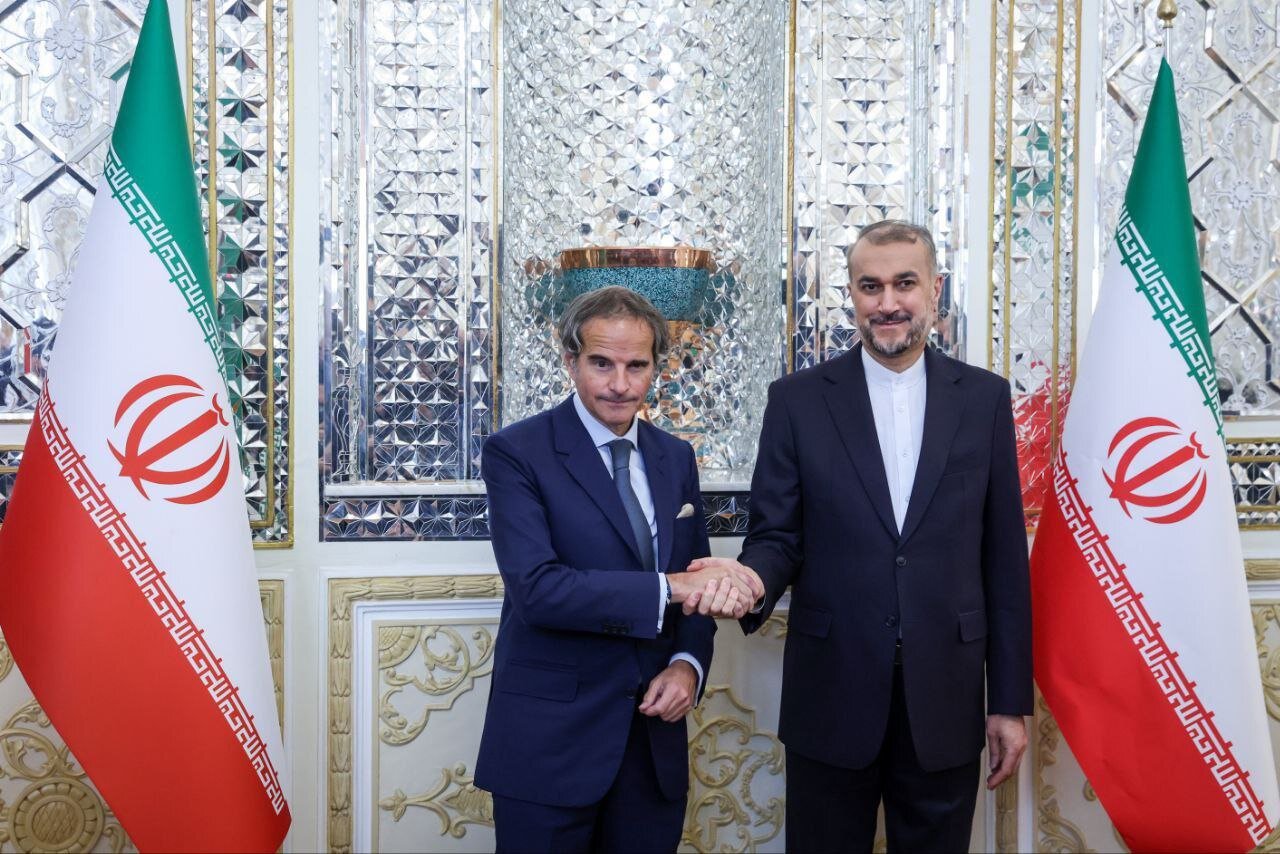Tehran cautions IAEA over U.S. political machinations

TEHRAN- The Iranian foreign minister has emphasized that the UN nuclear watchdog must take unbiased and professional positions, urging the U.S. officials to stop inconsistent and erratic actions that could hurt Tehran-IAEA cooperation.
Rafael Grossi, the Director General of the International Atomic Energy Agency, met with Hossein Amir Abdollahian, the Foreign Minister of Iran, on Monday in Tehran.
Grossi is in Iran to take part in the 30th national nuclear conference and the first International Conference on Nuclear Science and Technology.
The timing of the IAEA chief's trip to Iran, according to Amir Abdollahian, is ideal, especially in light of the delicate and complex circumstances in the region.
The Iranian foreign minister emphasized the vital role played by the IAEA and stated that stability and security will be restored to the region thanks to Grossi’s unbiased and professional views as well as Iran and the Agency’s successful collaboration.
According to the Foreign Ministry's website, the top Iranian diplomat then characterized the threats made by the Zionist authorities to use nuclear bombs as an obvious danger to regional and global peace and security.
He also underscored how crucial it is for the IAEA to react to such alarming claims made by the officials of a regime that is armed with nuclear weapons.
He continued by outlining the history of U.S. non-compliance with earlier agreements about Iran’s peaceful nuclear program and asserted that cooperation between Iran and the IAEA should not be impacted by Washington’s inconsistent and unstable policies and actions.
Amir Abdollahian also said that while this collaboration should continue in the correct path, both parties must believe that it leads to a breakthrough.
Grossi, for his part, praised Iran’s stance of recognizing and expanding the reassuring collaboration with the IAEA and emphasized Iran’s critical role in restoring peace and security to the region.
Grossi emphasized that anyone attempting to inflate conflict, tension, and confrontation in the region with any rationale or pretext will fail if Iran and the IAEA work together more closely.
The head of the IAEA expressed hope that meaningful agreements will be achieved during this visit in order to improve collaboration between the two sides, citing his prior successful trip to Tehran and agreement-making with Iran.
Grossi underlined again the significance of talks between Iran and the Agency to come to a consensus in order to settle all matters.
In the same day the IAEA chief arrived in Iran for high-level talks with the country’s officials, he also held talks with Iran’s top nuclear negotiator Ali Bagheri Kani.
Bagheri Kani discussed the Agency’s collaboration with Iran while highlighting the IAEA’s necessity to remain neutral.
Additionally, he stated that Iran has remained compliant with its international obligations regarding its peaceful nuclear operations.
On his part, Grossi stated that his visit to Tehran shows the IAEA’s commitment to preserving positive relations with the Islamic Republic.
During his visit to Iran, Grossi said that he has put forward “practical” steps to restore the Joint Statement of March 4, 2023 and rebuild trust between the UN nuclear watchdog and Tehran.
“I proposed a set of concrete practical measures for the revitalization of the 4 March 2023 Joint Statement with the aim of restoring process of confidence building and increasing transparency,” he said in a post on X after meeting with Amir Abdollahian and Bagheri Kani.
The head of the IAEA had earlier stated that persistent tensions between Tehran and the Agency were the reason behind the stalling of the Joint Statement’s implementation to address safeguards issues.
The fabricated documents that the Israeli regime sent to IAEA officials are the source of the safeguards-related accusations against Iran’s nuclear activity.
Israeli Prime Minister Benjamin Netanyahu claimed five years ago that “undeclared nuclear sites” in Iran contained “traces of uranium.” Since then, the Western media has emphasized such assertions.
The matter has emerged as a major source of contention in the currently unmoving negotiations to revive a nuclear accord from 2015, which the U.S. unilaterally withdrew from in 2018 and reinstated the economic sanctions on Iran that the accord had suspended.
Iran has often emphasized that no nation has unrestricted safeguards duties with the UN nuclear watchdog, even as it denies the accusations. Under the terms of a strategic law approved by the Iranian Parliament in 2020, Tehran has voluntarily decided to expand IAEA inspectors’ verification and oversight of its nuclear operations.
In a post on X on Tuesday, Amir Abdollahian expressed gratitude for the chief of the IAEA’s contribution to the restoration of calm and security in the region.
He said, “In addition to his effective contribution to the cooperation between Iran and the IAEA, Grossi’s impartial and professional stance as the Director General of the IAEA is also effective in restoring security and stable stability in the region,” referring to his important and constructive role in a realistic and fair view of Iran’s strong cooperation with the IAEA.
Grossi traveled to Iran at the invitation of the Head of the Atomic Energy Organization of Iran to participate in the 1st International Conference on Nuclear Science and Technology as well as the 30th National Nuclear Conference that kicked off in Isfahan on Monday.
Upon his arrival in Tehran on Monday, Grossi was welcomed by Behrouz Kamalvandi, the spokesman for the Atomic Energy Organization of Iran (AEOI).
Leave a Comment